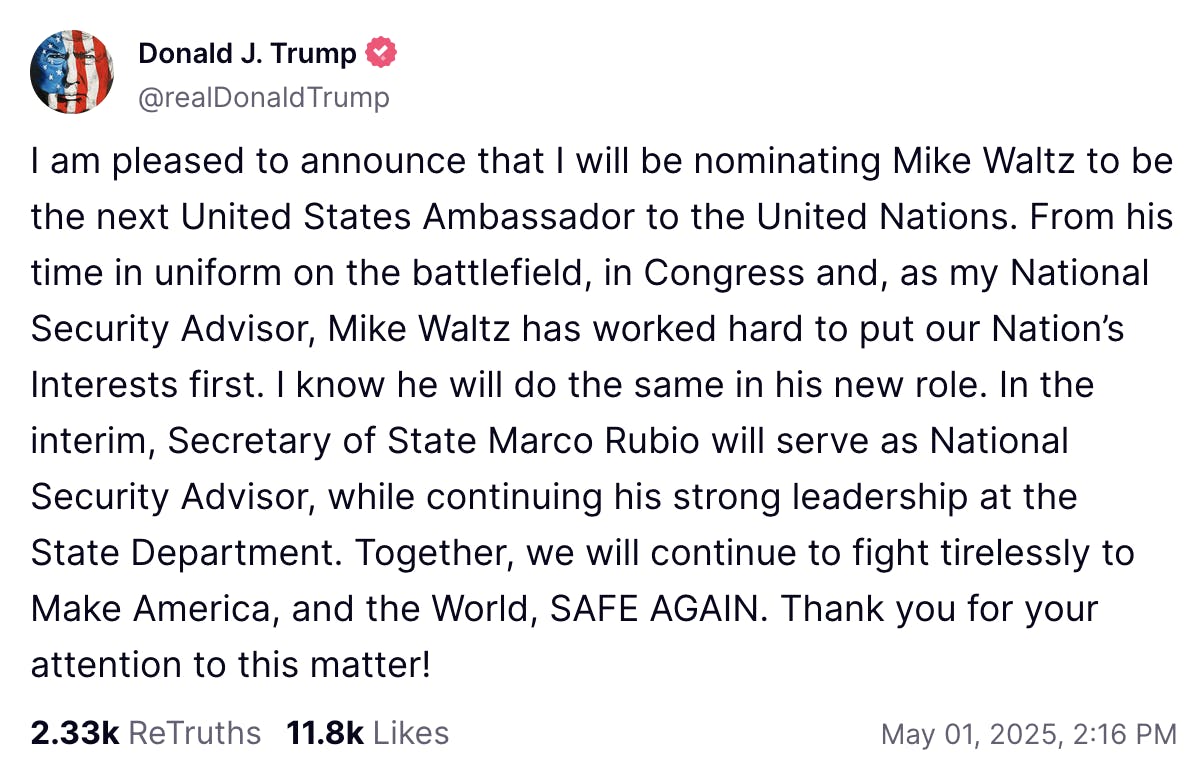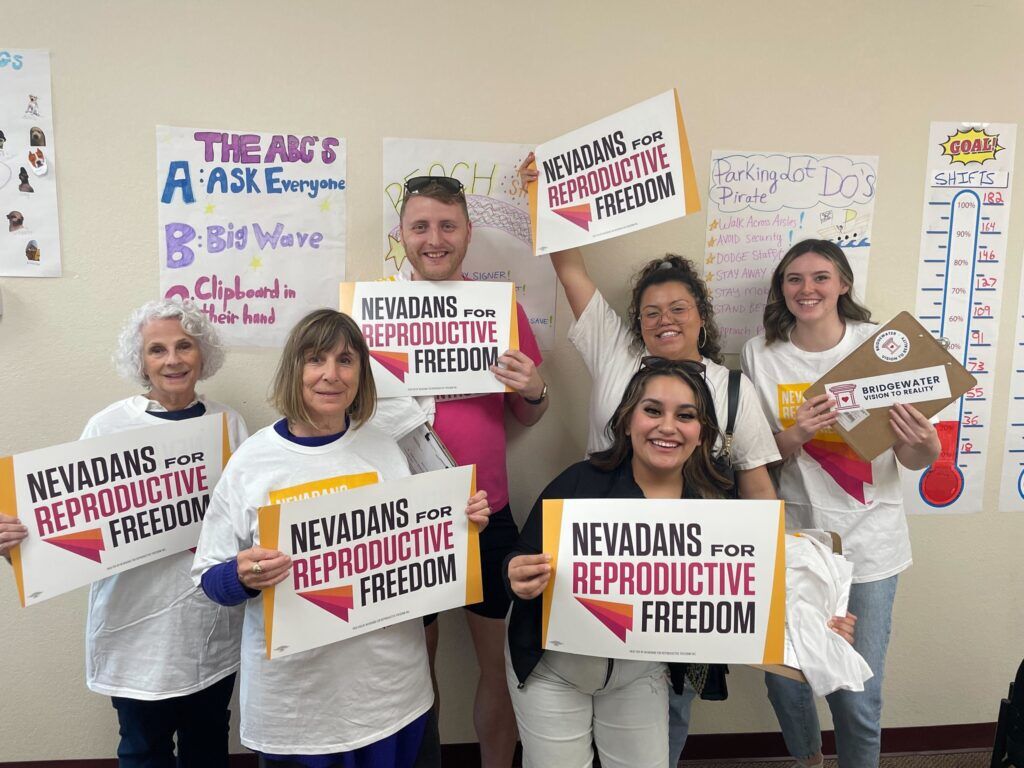
A Witch Hunt at the State Department
May 1, 2025
Trump Gave Marco Rubio Another Job—but Doesn’t Seem to Have Told Him
May 1, 2025From red states to battlegrounds, organizers behind recent abortion ballot measures are proving that reproductive rights can win—by centering community, resilience and grassroots power.
During the 2024 elections, 10 statewide abortion ballot measures aimed at expanding abortion rights in their respective states were certified for the general election ballot, marking the most in a single year. Seven of them passed: Arizona, Colorado, Maryland, Missouri, Montana, Nevada and New York. (Florida fell just 3 percent short of the 60 percent threshold required.)
This high success rate solidified what abortion advocates already knew: Abortion is popular.
Almost six months after results came rolling in, the women who worked on these ballot measures are reflecting on their hard work, their time working on the campaign and lending advice to other states looking to protect rights within their own borders.
For Lindsey Harmon, president of Nevadans for Reproductive Freedom, “it really was an opportunity for us to show and prove that this issue wins in battleground states as well.”
Harmon noted that in order for Nevada’s abortion protections to take effect, Question 6 will need to be approved by Nevada voters again in 2026.
Support for abortion was widespread, including from voters from deep red and rural districts. Colorado’s abortion proposition, Amendment 79, received the majority of the vote in every congressional district, including District 4, the seat currently held by Rep. Lauren Boebert (R).
“I was really lucky to work for the coalition I worked for that knew what their true north was in terms of the values. They really ingrained in me at the beginning that a right without access wasn’t good enough,” said Jess Grennan, campaign director for Coloradans for Protecting Reproductive Freedom, reflecting on Amendment 79, which overturned a constitutional ban in the state against public funding for abortions.
Center the people who need access to reproductive freedom the most. I think that was why we were successful …
Shanay Watson-Whittaker, deputy campaign manager of Yes on Prop 3 Michigan
Setting the Stage in 2022
Many of 2024’s abortion protections followed suit of those passed during the Biden administration. During the 2022 midterms six states voted in support of abortion rights: Kansas, Montana and Kentucky rejected abortion restrictions. Vermont, California and Michigan passed protections.
Motivated by the then-leaked Dobbs decision in May 2022, Michigan’s Reproductive Freedom for All ballot initiative turned in over 750,000 signatures placing it on the 2022 ballot and breaking the record for the most signatures collected for a ballot initiative in the state. Prop 3 passed in November 2022 with 56 percent of the vote.
Shanay Watson-Whittaker, deputy campaign manager of Yes on Prop 3 Michigan, emphasized the importance of including people from across the reproductive freedom space.
“Center the people who need access to reproductive freedom the most. I think that was why we were successful and why other states model what we did. We wanted to make sure that those partners that were not traditionally in the reproductive freedom space had their voices heard, amplified the message. They were included in the process and that actually spearheaded everything else.”
2024 Ballot Measures
In 2024, Maryland’s Question 1 passed with 76 percent of the vote. Erin Bradley, chair of Freedom in Reproduction Maryland, credits the state’s constitutional amendment’s success to her team’s ability to reach a wide array of Marylanders.
“Don’t assume the messages that are going to resonate with people. Don’t assume where people are. … There are so many nuances [in a statewide campaign], leaning into the expertise of those that actually know the people and what resonates with the people in their community is really important.”
Florida’s Right to Abortion Initiative
Even in states where ballot measures failed, the movement did not mark their efforts as such. While change is yet to be achieved at the constitutional level in many states, failed measures still contribute significantly to expanding reproductive freedom and its movement.
Even in a place where it feels like you should be hopeless again, I see these people that are just not willing to give up hope.
Sarah Parker, executive director of Voices of Florida
Florida’s Amendment 4, the Right to Abortion Initiative, was struck down after receiving 57 percent of the vote, just 3 percentage points short of the 60 percent supermajority required to pass. The state continues to operate under its six-week ban. Additionally, every state that Florida borders also has an abortion ban in place, making travel for those leaving the state for reproductive care especially difficult.
Despite the amendment’s failure, its vast majority support tells lawmakers that Floridians don’t agree with the restrictive abortion laws in their state. The campaign garnered significant momentum and organized movement building across the state.
“We have this amazing infrastructure, this amazing movement space, when at one point, a lot of people were working in their silos,” said Sarah Parker, executive director of the reproductive rights advocacy group, Voices of Florida. “Now, we created this infrastructure that we could call rapid response to resist. People are feeling rejuvenated right now across the country. We’re watching the 50501 Movement, which is grassroots and Voices of Florida, is actually doing a lot of work behind the scenes. We’re utilizing the same infrastructure in Florida that was created by Yes on 4.”
Parker stressed the importance of having grassroots organizations at the table when looking to advance reproductive rights at the state level. Although the amendment died in November, the communities and hope it created are holding strong well into the second Trump administration.
“Floridians and Floridian activists are just extremely resilient and, after a few months of rest, they were back up. Everyone’s going back to Tallahassee. A lot of grassroots are popping up, and we’re working together. I don’t know, it’s amazing. Even in a place where it feels like you should be hopeless again, I see these people that are just not willing to give up hope. They’re not willing to seed ground to their bodily autonomy, to equality or to equity, and I think that they’re going to continue to fight.”
Montana’s Right to Abortion Initiative passed with the same percentage that blocked Florida’s from passing: 57 percent.
Even when things feel really heavy and bad, there are still paths to protecting rights, and not all is lost.
Akilah Deernose, executive director of ACLU Montana
Akilah Deernose, executive director of ACLU Montana, also expressed a hopeful sentiment when juxtaposing Trump’s election with the work of reproductive rights advocates in her state.
“The morning after the election, when it became clear that we were going to be faced with another Trump administration, and what that would mean for the communities that we belong to, that we care about, that we fight for, was devastating. But, we had this win which provided so much hope and comfort and also made us realize that okay, even when things feel really heavy and bad, there are still paths to protecting rights, and not all is lost,” said Deernose. “In a time where the rest of the world felt so divided, it was really… unbelievable to get to be a part of something that felt so connective. I’m, personally, forever grateful to the Montanans that showed up and spoke up for what they believe in.”
Despite the Trump administration’s countless attacks on reproductive healthcare and freedom, the women who worked, and are still working, on initiatives to secure abortion rights across the country are finding reasons to celebrate. And in doing so, they are finding hope in their communities and a steadfast belief that the word can be better.
“Oftentimes I hear Florida’s hopeless, and I don’t believe that, because I get to be around these activists. I get to be around these people that are not even activists, and we’re so hopeful, and we’re so full of heart, and we’re angry at times, but we want a better Florida,” said Parker.
Great Job Livia Follet & the Team @ Ms. Magazine Source link for sharing this story.





